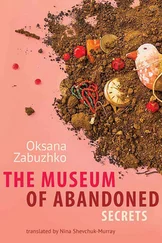From the heap of discarded papers and rubbish in the corner, I extracted the arm of a baby doll that had once been Füsun’s. I slipped that into my pocket, along with a large mica marble and a few hairpins that I had no doubt were hers. Imagining the comfort I would eventually extract from these things in privacy, I relaxed. Why, I asked the janitor’s wife, had the tenants chosen to leave after so many years? She said they had been haggling with the owner over the rent for ages. “It’s not as if rents are lower in other neighborhoods,” I said. Money was losing value, and prices were going up.
“So where did these people move to?” “We don’t know,” said the janitor’s wife. “They were cross with us when they left, and with the owner. Imagine, after twenty years, such a falling-out.” I felt I would suffocate on the spot.
It was then that I realized how I had always depended on the hope that one day I would come here, ring their doorbell, plead my way in, and see Füsun. Now that I’d been robbed of this chance I had not even realized I was counting on, I didn’t know where I would turn next.
Eighteen minutes later I was in the Merhamet Apartments, lying on our bed, finding such relief as I could from the new objects recovered from the empty apartment. Sure enough, these things that Füsun had touched, these objects that had made her who she was-as I caressed them, and gazed at them, and stroked them against my shoulders, my bare chest, and my abdomen-released their analgesic and soothed my soul.
38 The End-of-Summer Party
MUCH LATER, and without first stopping off at the office, I did go to Teşvikiye to help with the preparations. “I was going to ask you what to do about the champagne,” said Sibel. “I rang the office a few times, but every time they said you weren’t there.”
Offering her no explanation, I went directly to my bedroom. I remember lying on my bed, and thinking how unhappy I was, and feeling the party was doomed. By dreaming of Füsun, by conjuring with her things and taking consolation in them, I had sacrificed my self-respect, even as my distracted dreaming opened the door to another world that I wanted to explore more fully. The party that Sibel was so vigorously preparing required a rich, intelligent, cheerful, healthy man as host, one who knew how to take his pleasures, but I was in no condition to play that role. And there was no getting away with playing the sullen twenty-year-old, scowling and contemptuous, at a party in my own house. Sibel might be prepared to tolerate the effects of my nameless illness, but I could not expect such indulgence from our guests, eager for fun at the last party of summer.
At seven that evening I ushered the first guests to the bar we had set up-it was fully stocked with all the requisite foreign liquor bought under the counter from the city’s delicatessens-and like a good host, I offered them drinks. I remember occupying myself with the music for a time, and that I played Sergeant Pepper- I liked the cover-and Simon and Garfunkel. I danced-and laughed-with Sibel and Nurcihan. In the end, Nurcihan had chosen Mehmet over Zaim, but Zaim didn’t seem to mind. When Sibel told me, with a frown, that she thought Nurcihan had slept with Zaim, I could not understand why my fiancée was so upset by that, but I didn’t even try. There was beauty to behold in the world, that was all there was to it: the summer night was cooled by the north wind blowing off the Bosphorus, rustling the leaves of the plane trees in the courtyard of the Teşvikiye Mosque, and causing them to whisper in that lovely soft way I remembered from childhood; and at nightfall the swallows were screeching as they swooped over the dome of the mosque and the rooftops of the 1930s apartment buildings. As the sky grew darker still, I could begin to see the flickering lights of television sets in the homes of those who had not fled the city for the summer, among them a bored girl on one balcony and, sometime later, on another balcony, an unhappy father, gazing absently at the traffic in the avenue below. But as I watched all this listlessness, I felt as if I were watching my own feelings, and I was frightened by the thought that I might never be able to forget Füsun. As I sat there on our balcony, enjoying the cool evening, listening to the vivacious chatter of those who joined me from time to time, I drank like a fish.
Zaim had arrived with a lovely girl who was in high spirits because she had scored very high on the university entrance exam. Her name was Ayşe; I made pleasant conversation with her. I drank with a friend of Sibel’s-a shy fellow who worked as a leather exporter and could really hold his raki . Long after the sky had turned a velvety black, Sibel said, “You’re being rude. Come inside for a while.” Wrapping our arms around each other, embracing each other with all our strength, we danced that hopeless dance of ours, which to others looked so romantic. We’d turned off a few lights, so that it was dim in the sitting room, giving the apartment, in which I had spent my entire childhood, and indeed most of my life, the aspect and colors of a very different place; with this image came the idea of an entire world snatched away from me, and I embraced Sibel even more desperately as we continued dancing. Because so much of my misery that summer had infected my lovely fiancée-along with my drinking habits-she was as unsteady as I was.
In the parlance favored by the gossip columnists of the day, “as the evening progressed, under the effect of alcohol,” the party got out of hand. Glasses and bottles were broken, 45s and 33s destroyed, some couples who had fallen under the influence of European magazines began to kiss openly, or went into my or my brother’s bedroom, allegedly to make love, but possibly to pass out, and it was as if this group of young rich friends was in a collective panic, afraid that their youth, and their aspirations to be modern, would soon come to an end. Eight or ten years earlier, when I’d begun giving these end-of-summer parties, they’d been anarchic affairs, fueled by anger toward our parents; my friends would fiddle with our pricey kitchen appliances, often breaking them; they would go through my parents’ cupboards, pulling out old hats, perfume spray bottles, electric shoe buffers, bow ties, and dresses, convinced all the while that their destructive energy was political, and so enjoying it all the more.
In the years that followed, only two members of this large crowd took to politics in a serious way; one would be tortured by the police in the aftermath of the 1971 coup, and remain in prison until the 1974 amnesty; and it is likely that both of them dismissed the rest of us as “irresponsible, spoiled, and bourgeois,” but for whatever reason, they cooled to our company and lost touch.
Now, as dawn approached, and Nurcihan went through my mother’s drawers, it was not out of anarchic anger, but a womanly curiosity, expressed with refinement and no small degree of respect. “We’re going to Kilyos for a swim,” she told me solemnly. “I was just checking to see if your mother had a swimsuit.” Suddenly flooded with intense remorse and pain for never having taken Füsun to Kilyos, where she had so longed to go, it was all I could do to collapse onto my parents’ bed. From where I lay, I could see drunken Nurcihan pretend to look for a swimsuit as she covetously fingered my mother’s embroidered stockings from the 1950s, the elegant umber lace-up corsets, and the hats and scarves that she had not exiled to the Merhamet Apartments. Also passing through Nurcihan’s appreciative hands were the titles for all the houses, apartments, and lots that we owned, and that my mother kept in a drawstring pouch in her stockings drawer, because she didn’t trust the bank’s safe deposit box, and piles and piles of keys to locks unknown, apartments that had been sold or rented out. There was also a thirty-six-year-old clipping from a gossip column, featuring my parents’ wedding, and another from the society pages of Hayat magazine, dated twelve years later, with my mother looking very chic and attractive at a party. “How lovely your mother was, she was such an interesting woman,” Nurcihan said. “She’s still alive,” I said, still lying like a corpse on the bed, and thinking how wonderful it would be to spend the rest of my life with Füsun in this room. Nurcihan let out a sweet and happy laugh, and it was this, I think, that drew Sibel into the room, followed soon after by Mehmet. Sibel and Nurcihan went through the rest of my mother’s things with drunken ceremony, while Mehmet sat on the bed (in just the place where my father would sit in the morning, staring absently at his toes before putting on his slippers), gazing at Nurcihan with love and admiration. He was so very happy, having, for the first time in years, fallen head over heels in love with a woman he could marry, and it seemed to come as a shock to him, as if he were ashamed of being that happy. But I did not envy him, because I sensed an overwhelming fear of being deceived-the ever-lurking possibility that things would come to a bad and degrading end-and regret.
Читать дальше












